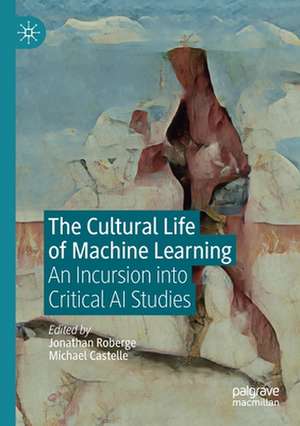The Cultural Life of Machine Learning: An Incursion into Critical AI Studies
Editat de Jonathan Roberge, Michael Castelleen Limba Engleză Paperback – 2 dec 2021
Chapter 2 is available open access under a Creative Commons Attribution 4.0 International License via link.springer.com.
| Toate formatele și edițiile | Preț | Express |
|---|---|---|
| Paperback (1) | 485.61 lei 6-8 săpt. | |
| Springer International Publishing – 2 dec 2021 | 485.61 lei 6-8 săpt. | |
| Hardback (1) | 524.18 lei 3-5 săpt. | +23.22 lei 6-12 zile |
| Springer International Publishing – dec 2020 | 524.18 lei 3-5 săpt. | +23.22 lei 6-12 zile |
Preț: 485.61 lei
Nou
Puncte Express: 728
Preț estimativ în valută:
92.92€ • 99.37$ • 77.48£
92.92€ • 99.37$ • 77.48£
Carte tipărită la comandă
Livrare economică 17 aprilie-01 mai
Preluare comenzi: 021 569.72.76
Specificații
ISBN-13: 9783030562885
ISBN-10: 3030562883
Pagini: 289
Ilustrații: XV, 289 p. 10 illus., 7 illus. in color.
Dimensiuni: 148 x 210 x 22 mm
Greutate: 0.37 kg
Ediția:1st ed. 2021
Editura: Springer International Publishing
Colecția Palgrave Macmillan
Locul publicării:Cham, Switzerland
ISBN-10: 3030562883
Pagini: 289
Ilustrații: XV, 289 p. 10 illus., 7 illus. in color.
Dimensiuni: 148 x 210 x 22 mm
Greutate: 0.37 kg
Ediția:1st ed. 2021
Editura: Springer International Publishing
Colecția Palgrave Macmillan
Locul publicării:Cham, Switzerland
Cuprins
1. Toward an End-to-End Sociology of 21st-Century Machine Learning.- 2. Mechanized Significance and Machine Learning: Why it Became Thinkable and Preferable to Teach Machines to Judge the World.- 3. What Kind of Learning Is Machine Learning?.- 4. The Other Cambridge Analytics: Early “Artificial Intelligence” in American Political Science.- 5. Machinic Encounters: A Relational Approach to the Sociology of AI.- 6. AlphaGo’s Deep Play: Technological Breakthrough as Social Drama.- 7. Adversariality in Machine Learning Systems: On Neural Networks and the Limits of Knowledge.- 8. Planetary Intelligence.- 9. Critical Perspectives on Governance Mechanisms for AI/ML Systems.
Notă biografică
Jonathan Roberge is an Associate Professor at the Institut National de la Recherche Scientifique in Montreal, Canada. He funded the Nenic Lab as part of the Canada Research Chair in Digital Culture he has held since 2012. His most recent edited volume is Algorithmic Cultures (2016).
Michael Castelle is an Assistant Professor at the University of Warwick’s Centre for Interdisciplinary Methodologies, UK and a Turing Fellow at the Alan Turing Institute, UK. He has a Ph.D. in Sociology from the University of Chicago and a Sc.B. in Computer Science from Brown University.
Michael Castelle is an Assistant Professor at the University of Warwick’s Centre for Interdisciplinary Methodologies, UK and a Turing Fellow at the Alan Turing Institute, UK. He has a Ph.D. in Sociology from the University of Chicago and a Sc.B. in Computer Science from Brown University.
Textul de pe ultima copertă
This book brings together the work of sociologists and historians along with perspectives from media studies, communication studies, cultural studies, and information studies to address the origins, practices, and possible futures of contemporary machine learning. From its foundations in 1950s and 1960s pattern recognition and neural network research to the modern-day social and technological dramas of DeepMind’s AlphaGo, predictive political forecasting, and the governmentality of extractive logistics, machine learning has become controversial precisely because of its increased embeddedness and agency in our everyday lives. How can we disentangle the history of machine learning from conventional histories of artificial intelligence? How can machinic agents’ capacity for novelty be theorized? Can reform initiatives for fairness and equity in AI and machine learning be realized, or are they doomed to cooptation and failure? And just what kind of “learning” does machine learning trulyrepresent? Contributors empirically address these questions and more to provide a baseline for future research.
Jonathan Roberge is an Associate Professor at the Institut National de la Recherche Scientifique in Montreal, Canada. He funded the Nenic Lab as part of the Canada Research Chair in Digital Culture he has held since 2012. His most recent edited volume is Algorithmic Cultures (2016).
Michael Castelle is an Assistant Professor at the University of Warwick’s Centre for Interdisciplinary Methodologies, UK and a Turing Fellow at the Alan Turing Institute, UK. He has a Ph.D. in Sociology from the University of Chicago and a Sc.B. in Computer Science from Brown University.
Chapter 2 is available open access under a Creative Commons Attribution 4.0 International License via link.springer.com.
Jonathan Roberge is an Associate Professor at the Institut National de la Recherche Scientifique in Montreal, Canada. He funded the Nenic Lab as part of the Canada Research Chair in Digital Culture he has held since 2012. His most recent edited volume is Algorithmic Cultures (2016).
Michael Castelle is an Assistant Professor at the University of Warwick’s Centre for Interdisciplinary Methodologies, UK and a Turing Fellow at the Alan Turing Institute, UK. He has a Ph.D. in Sociology from the University of Chicago and a Sc.B. in Computer Science from Brown University.
Chapter 2 is available open access under a Creative Commons Attribution 4.0 International License via link.springer.com.
Caracteristici
Offers an empirically-based discussion of machine learning and artificial intelligence technologies in society Provides new histories of machine learning and artificial intelligence rooted in humanities and social sciences approaches Places technologies in conversation with central theories and topics in the humanities and social sciences
